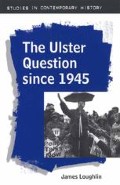Abstract
Signed by Margaret Thatcher and Garret FitzGerald at Hillsborough Castle, county Down, on 15 November 1985, the Anglo-Irish Agreement is an international treaty between the United Kingdom and the Irish Republic. It is a multi-dimensional response to the Ulster problem premised on the understanding that the involvement of both states is an essential basis for any solution. At its heart is the Inter-Governmental Conference (IGC), established to enable London and Dublin to harmonise their approaches to the North, and in this context the Agreement commits both governments to promote the establishment of devolved government in the North based on agreement between the constitutional parties. Until such a government emerges, however, the Irish government represents the interests of the Catholic community at the IGC, its role in the government of the North being symbolised by a permanent Secretariat of Irish civil servants at Maryfield, outside Belfast.
Preview
Unable to display preview. Download preview PDF.
Author information
Authors and Affiliations
Copyright information
© 1998 James Loughlin
About this chapter
Cite this chapter
Loughlin, J. (1998). Agreement and Process. In: The Ulster Question since 1945. Studies in Contemporary History. Palgrave, London. https://doi.org/10.1007/978-1-349-26708-8_5
Download citation
DOI: https://doi.org/10.1007/978-1-349-26708-8_5
Publisher Name: Palgrave, London
Print ISBN: 978-0-333-60616-2
Online ISBN: 978-1-349-26708-8
eBook Packages: Palgrave History CollectionHistory (R0)

